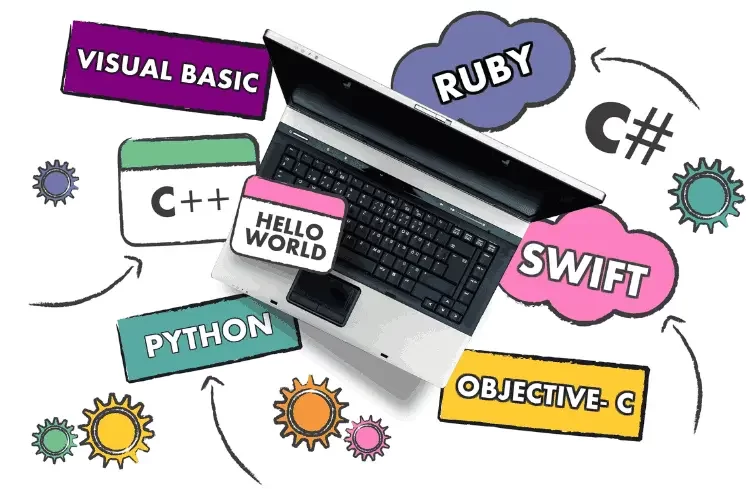
Programming languages have been used by programmers for many years to create innovative new tools and speed up the coding process. We’ve been doing quite well with it so far, aren’t we? Of course, we are! Not just that, we have pushed the limits of what is feasible thanks to improvements in programming languages and software development in general.
We can see that businesses are now more effective, and people are now more efficient and amused than ever before. Additionally, the foundational components of our economic system, such as the safe interchange of money, have undergone a radical redesign.
So, after all this, where do you picture the languages in the future? Do you think we’ll be introduced to some new and even more effective language? Or will the significance of programming languages deteriorate?
Keep reading if you want to know everything about the future of programming languages in detail as we are not going to leave anything behind in this blog!
We all are talking about programming languages knowing the fact that it holds a prominent position in the present era. But let us just understand what are the functions of these languages and why they were introduced. Then we will go ahead and discuss its present and future,

Do you know where these languages are used at present? We understand that only those who belong to the field concerned might be able to answer this question. This is why we are going to brief you about their functionality.
First of all, you should know that computers can only interpret binary code, which consists of ones and zeros. But, it is a highly time-consuming task to program a complicated software application using only ones and zeros.
Moreover, it would be nearly difficult to find any errors that affected the app’s operation. And, this is why programming languages were introduced!
We can say that programming languages are designed to make it easier for developers to code and to elevate coding to a higher level of abstraction. They can be viewed as an interface that enables the communication between software developers and computers in a language that is clear to both sides.
Software developers can use phrases, functions, and other more understandable entries in place of binary digits. It greatly simplifies the programming process and facilitates error detection when required. This way, languages further greatly increase the accessibility of programming to a wider range of individuals.
We cannot exactly understand what future developers will expect from the programming languages. This is mainly because no one can tell what technologies will be dominating the world in the coming future. But, what we can do is talk about a few important elements that future Programming Languages might need to possess.
We know that today’s tools and apps must communicate often with one another, the cloud, and other databases. So, we can expect modern programming languages to therefore support simple and practical API calls.
Developers’ preference for automation is understandable given that it makes things simpler, isn’t it? Programmers in the future might want to automate programming language operations. This will enable them to streamline mundane tasks, test code for flaws, and release code more quickly and efficiently.
Both experts and beginners are expected to need straightforward programs and scripts, such as those that simplify spreadsheet maintenance. Because of this, new programming languages must have the easiest, most approachable learning curve possible to thrive.
Programming languages were created to abstract away the extremely technical world of coding. And, future programming languages might take this abstraction a step further. This might be done by combining functions and streamlining commands to make them even easier to understand.
It’s difficult to predict what kinds of gadgets we’ll create and eventually need in the future. So, future programming languages must be adaptable and provide lots of potential for future expansion and improvement.
Although it’s difficult to forecast which programming language will replace Python or JavaScript, there are several promising and intriguing newcomers. Julia, for instance, was created in 2012 and aims to make it simpler to analyze numbers and mathematical equations. This further makes it the perfect programming language for data scientists, a profession that is becoming more and more relevant.
Other than that, Go offers customers a very plain tool with clear syntax. It’s much better than Google’s attempt to establish a language that brings together the best aspects of multiple existing languages. We can even expect new programming languages to come to the surface shortly that might dominate the industry.
There’s no doubt that the advancement of programming languages will surely impact Programmers and software developers. Always remember that the ecosystem of accessible programming languages will change, whether you like it or not. You may either change with it or try to maintain your adherence to outdated code standards.
It goes without saying that you’ll have to master a new programming language if the specific project you’re focusing on requires it. This is why we can say that converting businesses to the digital world has several advantages. And, one of them is having your developers master various programming languages which further has many benefits.
You can work on a wide range of projects if you are proficient in several programming languages. If you run your own company or work as a freelancer, you get the opportunity to greatly expand your clientele. And, if you’re looking for work or already have a job, knowing different programming languages makes you considerably more valuable.
Increasing your flexibility is another excellent benefit of learning new languages. When you handle the same tasks every day, it’s simple to become accustomed to them. On this path, you can carve out a respectable profession for yourself, but you’ll never realize your full potential. On the contrary, you’ll position yourself to be much more adaptive if you make a conscious effort to study new languages.
When all you think about is one language, you are constraining yourself from more conceptual thinking. No matter how much time you spend on one programming language, it’s not going to help you. But, on the other hand, learning different languages can improve your thinking ability. This is just the same as learning various human languages can increase your creativity and enable you to construct knowledge more abstractly.
All in all, we can say that the future of programming languages is bright. The significance of languages will be the same or might even increase in the future. But, the good part is that the world of programming won’t be destroyed and rebuilt. These changes will rather take place gradually and incrementally, providing every one of us the opportunity to maintain our current level of learning and to keep learning well into the future. There are a lot many online courses available that can help you learn these languages.
But, at the same time, we need to keep a track of how things are changing in that field. You need to stay updated for upcoming new languages, and if you’re a programmer, keep pushing yourself to learn new things.
We provide online certification in Data Science and AI, Digital Marketing, Data Analytics with a job guarantee program. For more information, contact us today!
Courses
1stepGrow
Anaconda | Jupyter Notebook | Git & GitHub (Version Control Systems) | Python Programming Language | R Programming Langauage | Linear Algebra & Statistics | ANOVA | Hypothesis Testing | Machine Learning | Data Cleaning | Data Wrangling | Feature Engineering | Exploratory Data Analytics (EDA) | ML Algorithms | Linear Regression | Logistic Regression | Decision Tree | Random Forest | Bagging & Boosting | PCA | SVM | Time Series Analysis | Natural Language Processing (NLP) | NLTK | Deep Learning | Neural Networks | Computer Vision | Reinforcement Learning | ANN | CNN | RNN | LSTM | Facebook Prophet | SQL | MongoDB | Advance Excel for Data Science | BI Tools | Tableau | Power BI | Big Data | Hadoop | Apache Spark | Azure Datalake | Cloud Deployment | AWS | GCP | AGILE & SCRUM | Data Science Capstone Projects | ML Capstone Projects | AI Capstone Projects | Domain Training | Business Analytics
WordPress | Elementor | On-Page SEO | Off-Page SEO | Technical SEO | Content SEO | SEM | PPC | Social Media Marketing | Email Marketing | Inbound Marketing | Web Analytics | Facebook Marketing | Mobile App Marketing | Content Marketing | YouTube Marketing | Google My Business (GMB) | CRM | Affiliate Marketing | Influencer Marketing | WordPress Website Development | AI in Digital Marketing | Portfolio Creation for Digital Marketing profile | Digital Marketing Capstone Projects
Jupyter Notebook | Git & GitHub | Python | Linear Algebra & Statistics | ANOVA | Hypothesis Testing | Machine Learning | Data Cleaning | Data Wrangling | Feature Engineering | Exploratory Data Analytics (EDA) | ML Algorithms | Linear Regression | Logistic Regression | Decision Tree | Random Forest | Bagging & Boosting | PCA | SVM | Time Series Analysis | Natural Language Processing (NLP) | NLTK | SQL | MongoDB | Advance Excel for Data Science | Alteryx | BI Tools | Tableau | Power BI | Big Data | Hadoop | Apache Spark | Azure Datalake | Cloud Deployment | AWS | GCP | AGILE & SCRUM | Data Analytics Capstone Projects
Anjanapura | Arekere | Basavanagudi | Basaveshwara Nagar | Begur | Bellandur | Bommanahalli | Bommasandra | BTM Layout | CV Raman Nagar | Electronic City | Girinagar | Gottigere | Hebbal | Hoodi | HSR Layout | Hulimavu | Indira Nagar | Jalahalli | Jayanagar | J. P. Nagar | Kamakshipalya | Kalyan Nagar | Kammanahalli | Kengeri | Koramangala | Kothnur | Krishnarajapuram | Kumaraswamy Layout | Lingarajapuram | Mahadevapura | Mahalakshmi Layout | Malleshwaram | Marathahalli | Mathikere | Nagarbhavi | Nandini Layout | Nayandahalli | Padmanabhanagar | Peenya | Pete Area | Rajaji Nagar | Rajarajeshwari Nagar | Ramamurthy Nagar | R. T. Nagar | Sadashivanagar | Seshadripuram | Shivajinagar | Ulsoor | Uttarahalli | Varthur | Vasanth Nagar | Vidyaranyapura | Vijayanagar | White Field | Yelahanka | Yeshwanthpur
Mumbai | Pune | Nagpur | Delhi | Gurugram | Chennai | Hyderabad | Coimbatore | Bhubaneswar | Kolkata | Indore | Jaipur and More